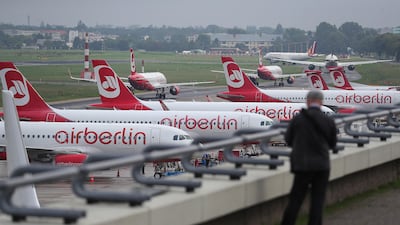The buyers of insolvent Air Berlin's assets will likely be picked by mid-September, people familiar with the matter told Reuters, as the race for the carrier's coveted take-off and landing slots in Germany heats up.
Suitors have until September 13 to make bids and present their business plans to the airline's administrator and lenders, two sources told Reuters.
A committee of creditors overlooking the liquidation aim to come to an agreement who will buy what shortly thereafter, the sources said, with one of them saying the decision could come as early as September 15.
Another source cautioned that the schedule was ambitious because new suitors keep lining up.
_______________
Read more:
Etihad's airberlin exit signals sea change in global aviation
Bankrupt airberlin desperately needs quick fix
Air Berlin files for insolvency after losses mount
_______________
Air Berlin chief executive Thomas Winkelmann has said time is of the essence and wants a deal before the end of September.
The carrier, which declined to comment, has been in talks with interested parties since it filed for insolvency on August 15 after its major shareholder, Abu Dhabi's Etihad Airways, denied it any further funding.
Lufthansa, Thomas Cook's Condor, easyJet and Ryanair are among airlines interested in the carrier's business or parts of it, sources familiar with the negotiations have said.
German aviation investor Hans Rudolf Woehrl is also working on a bid and former F1 driver Niki Lauda has indicated his interested in buying back Air Berlin's Niki, the Austrian airline he once owned.
Air Berlin is being kept in the air thanks to a 150 million euro (U$177 million) government loan.
Part of Air Berlin's appeal to bidders lies in its access to take-off and landing slots at airports such as Duesseldorf, in Germany's most populous region.

